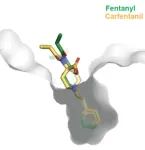(Press-News.org) Outbreaks of polycystic echicnococcosis, a life-threatening zoonotic disease, are driven by regional climate changes, according to a study led by the Barcelona Institute for Global Health (ISGlobal), an institution supported by “la Caixa” Foundation. The findings, published in PNAS, provide evidence of the impact of climate on neglected tropical diseases in the Amazon region, with implications for other zoonoses.
Polycystic echinococcosis (PE) is a neglected life-threatening zoonosis caused by an intestinal worm (Echinococcus vogeli) endemic in neotropical forests such as the Amazon. Although treatable, the disease can be fatal for about 1 in 3 infected people if not diagnosed in time. The parasite normally lives in animal reservoirs but can be transmitted to humans who handle infected animals, particularly pacas (a large rodent that is usually hunted for food).
“Polycystic echinococcosis is a good example of the many zoonotic diseases associated with the handling and consumption of wild meat,” says Xavier Rodó, ISGlobal researcher and last author of the study. “Understanding the role of climate in the emergence and spread of these zoonoses is becoming increasingly important, given the ongoing global warming scenario,” he adds.
In this study, Rodó and his team compiled two unique databases: one of PE infections in animals and humans covering the entire Amazon region (around 400 cases), and another one on hunting practices (containing almost 440,000 observations of animals hunted in 55 independent study areas in seven Amazonian countries and the French Guiana, over the last 55 years). This allowed the authors to understand the spatial distribution of PE, and to investigate how the disease is influenced by ecological, environmental and climatic factors, as well as hunting patterns. To do this, they developed two independent prediction models: one for animal infections (i.e. the sylvatic model) and one for human infections (i.e. the spillover model).
The analysis shows that stable temperatures favour the sylvatic cycle (i.e. the circulation of the parasite in animal reservoirs), while extreme climate events (such as El Niño) disrupt hunting patterns and favour parasite spillover to humans. “This means that regional climate change due to global warming may indirectly drive disease outbreaks in humans,” says Adrià San José, first author of the study. This also means that information on land use and climate projections could be useful for early warning of potential PE hotspots.
These findings have clear implications for other similar hunting-related zoonoses. They also highlight the value of comprehensive databases for understanding the role of climate in the emergence and spread of zoonotic disease outbreaks.
Reference
Adrià San-José, Pedro Mayor, Bruno Carvalho et al. Climate determines transmission hotspots of Polycystic Echinococcosis, a lifethreatening zoonotic disease, across Pan-Amazonia. PNAS. 2023.
END
Climate influences the spread of a life-threatening zoonotic disease in the Amazon
A study finds that polycystic echinococcosis, a neglected disease with a high mortality rate, is sensitive to climate, making it possible to predict potential infection hotspots
2023-08-07
ELSE PRESS RELEASES FROM THIS DATE:
Research discovers key cause of restricted blood flow to the brain in vascular dementia
2023-08-07
Groundbreaking new research has uncovered a potential route to developing the first ever drug treatments for vascular dementia, that directly target a cause of the condition. The research, funded by the British Heart Foundation and published in the journal Proceedings of the National Academy of Sciences, [1] has shed light on how high blood pressure causes changes to arteries in the brain, a process that leads to the devastating condition.
High blood pressure is a main cause of vascular dementia, a condition characterised by poor blood flow to the brain. The reduced blood supply starves brain cells of nutrients and over time they become damaged ...
Latest in body art? ‘Tattoos’ for individual cells
2023-08-07
Engineers have developed nanoscale tattoos—dots and wires that adhere to live cells—in a breakthrough that puts researchers one step closer to tracking the health of individual cells.
The new technology allows for the first time the placement of optical elements or electronics on live cells with tattoo-like arrays that stick on cells while flexing and conforming to the cells’wet and fluid outer structure.
“If you imagine where this is all going in the future, we would like to have sensors to remotely monitor and ...
Georgia State Researcher awarded $3.6 million grant to help address mental health crisis in schools
2023-08-07
ATLANTA — Catherine Perkins, a clinical professor in the College of Education & Human Development at Georgia State University, has been awarded a five-year, $3.6 million grant by the U.S. Department of Education to expand quality school-based mental health (SBMH) services for underserved populations in high-need schools.
The Expanding Quality SBMH Services for Underserved Populations with Inclusive Practices (GSU-EQUIP) grant will have a direct impact in metro Atlanta by increasing access to school-based programs and strengthening the candidate pool of mental ...
Current estimates of Lake Erie algae toxicity may miss the mark
2023-08-07
COLUMBUS, Ohio – There is more to a harmful algal bloom than the green stuff in water that meets the eye – specifically, a changing hazard level of toxins produced by the microbes that make up the scummy mess.
A new study analyzing toxins produced by Microcystis, the main type of cyanobacteria that compose the annual harmful algal bloom (HAB) in Lake Erie, suggests that the toxicity of the bloom may be overestimated in earlier warm months and underestimated later in the summer.
The research is part of a large project, led by The Ohio State University, designed to develop a more accurate harmful algal bloom toxicity forecast ...
Dogs with less complex facial markings found to be more expressive in their communication with humans
2023-08-07
WASHINGTON (August 7, 2023) – The domestication of canines and their co-evolution with humans has fostered an incredibly unique relationship with these animals. Over time, our four-legged friends have adapted well to understanding human modes of communication, both verbal and nonverbal. However, researchers at the George Washington University say humans could do more to better understand our furry companions, and a dogs’ facial markings may be one key to meeting them halfway.
In a new paper published in the journal Animals, ...
Century-old coral reveals Pacific western boundary current strengthened as climate warmed, impacting El Niño
2023-08-07
Chestnut Hill, Mass. (8/7/2023) - The Pacific Ocean’s western boundary current, which forms a critical regulator of sea surface temperature and weather patterns, has significantly strengthened as the planet warms, according to a new study published in the journal Nature Geoscience.
The study provides the first evidence that the western boundary current in the South Pacific has significantly strengthened during the 20th century in response to global warming, contributing to an intensified equatorial undercurrent, according to Boston College Assistant Professor of Earth and Environmental Sciences Xingchen (Tony) Wang, a co-author ...
For Black teens, school belonging can be a matter of life and death
2023-08-07
Academic performance has long been linked to how supported students feel at school. Now, a Rutgers study suggests this sentiment is also essential to preventing suicides.
A Rutgers researcher found that having a strong sense of school belonging – the subjective feeling of being accepted, valued, included and encouraged in the school community – could mitigate suicidal tendencies among Black adolescents.
“Having a supportive teacher or other nonparent adult can change a child’s life because they will want to go to school,” said Adrian Gale, an assistant professor at the Rutgers School of Social Work and co-author of the study ...
Human antibody that targets carfentanil, fentanyl and related opioids reverses overdose effects in preclinical study
2023-08-07
LA JOLLA, CA—An antibody in single-chain fragment variable (scFv) format that binds to the powerful opioid carfentanil was shown to reverse signs of carfentanil overdose in preclinical tests conducted by scientists at Scripps Research.
Carfentanil is a variant of the synthetic opioid fentanyl, and about 100 times as potent as its chemical cousin. Along with fentanyl and other fentanyl variants, it is commonly mixed with illegal drugs such as heroin and cocaine to enhance their euphoric effects, resulting in many fatal overdoses.
In the study, published in ACS ...
Midwest Integrated Center for Computational Materials renewed by U.S. Department of Energy
2023-08-07
The U.S. Department of Energy (DOE) has announced the renewal of the Midwest Integrated Center for Computational Materials (MICCoM) for another three years at $3 million per year. Founded in 2015, the Center is headquartered at DOE’s Argonne National Laboratory. Partnering universities include the University of Chicago, University of Notre Dame and University of California, Davis.
“The MICCoM team has been at the forefront of developing simulation methods and codes and solving cutting-edge materials science problems,” said Center director Giulia Galli. She is also a senior scientist in Argonne’s Materials Science division and professor in the ...
New blood-pressure related measure predicts health outcomes in patients with intensive care
2023-08-07
Key Takeaways
A new method derived from standard blood pressure assessments can improve monitoring of critically ill patients with circulatory shock
The method accurately predicts risk of death, length of hospital stay, and blood lactate levels (an indicator of tissue perfusion and oxygenation).
BOSTON – Critically ill patients with circulatory shock—when the heart cannot pump enough blood and oxygen to the rest of the body, often as a result of heart failure, sepsis, or hemorrhage—require close monitoring and treatment, especially to maintain adequate blood pressure to prevent injury to important organs. ...
LAST 30 PRESS RELEASES:
A promising potential therapeutic strategy for Rett syndrome
How time changes impact public sentiment in the U.S.
Analysis of charred food in pot reveals that prehistoric Europeans had surprisingly complex cuisines
As a whole, LGB+ workers in the NHS do not experience pay gaps compared to their heterosexual colleagues
How cocaine rewires the brain to drive relapse
Mosquito monitoring through sound - implications for AI species recognition
UCLA researchers engineer CAR-T cells to target hard-to-treat solid tumors
New study reveals asynchronous land–ocean responses to ancient ocean anoxia
Ctenophore research points to earlier origins of brain-like structures
Tibet ASγ experiment sheds new light on cosmic rays acceleration and propagation in Milky Way
AI-based liquid biopsy may detect liver fibrosis, cirrhosis and chronic disease signals
Hope for Rett syndrome: New research may unlock treatment pathway for rare disorder with no cure
How some skills become second nature
SFU study sheds light on clotting risks for female astronauts
UC Irvine chemists shed light on how age-related cataracts may begin
Machine learning reveals Raman signatures of liquid-like ion conduction in solid electrolytes
Children’s Hospital of Philadelphia researchers emphasize benefits and risks of generative AI at different stages of childhood development
Why conversation is more like a dance than an exchange of words
With Evo 2, AI can model and design the genetic code for all domains of life
Discovery of why only some early tumors survive could help catch and treat cancer at very earliest stages
Study reveals how gut bacteria and diet can reprogram fat to burn more energy
Mayo Clinic researchers link Parkinson's-related protein to faster Alzheimer's progression in women
Trends in metabolic and bariatric surgery use during the GLP-1 receptor agonist era
Loneliness, anxiety symptoms, depressive symptoms, and suicidal ideation in the all of us dataset
A decision-support system to personalize antidepressant treatment in major depressive disorder
Thunderstorms don’t just appear out of thin air - scientists' key finding to improve forecasting
Automated CT scan analysis could fast-track clinical assessments
New UNC Charlotte study reveals how just three molecules can launch gene-silencing condensates, organizing the epigenome and controlling stem cell differentiation
Oldest known bony fish fossils uncover early vertebrate evolution
High‑performance all‑solid‑state magnesium-air rechargeable battery enabled by metal-free nanoporous graphene
[Press-News.org] Climate influences the spread of a life-threatening zoonotic disease in the AmazonA study finds that polycystic echinococcosis, a neglected disease with a high mortality rate, is sensitive to climate, making it possible to predict potential infection hotspots



